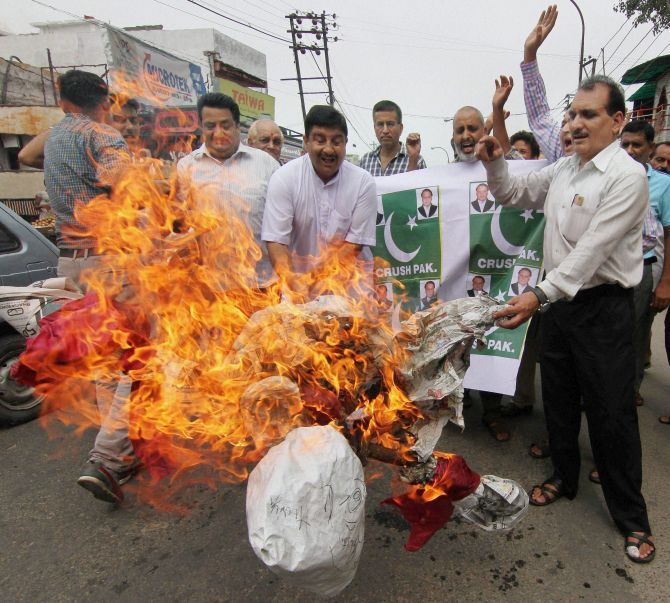
A deadlock over Kashmiri separatist leaders on Friday cast a cloud of uncertainty over the upcoming Indo-Pak NSA-level meeting after the two countries engaged in strong exchanges but neither side was willing to blink.
Even as it appeared that the prospects of talks have dimmed, Pakistan tonight said that hardline separatist leader Syed Ali Shah Geelani would be meeting its National Security
Adviser Sartaj Aziz at 9.30 am on Monday, apparently ahead of his scheduled discussions with his Indian counterpart Ajit Doval.
India having made it clear that a meeting between the separatists and Aziz was not acceptable to it, the scheduling of the Geelani-Aziz meeting introduced a new twist into the drama.
Geelani was among the separatist leaders who was briefly detained in Srinagar yesterday and it would be a surprise if he is allowed to travel here for the meeting. The onus would then be on Pakistan on either still going ahead with the talks or calling them off.
Drawing a redline, earlier India had made it clear to Pakistan that a meeting between the separatists and Aziz was not appropriate.
Pakistan reacted strongly to insist that it would not depart from the "established past practice" of interacting with separatist Hurriyat leaders, rejecting India's advice not to go ahead with their meeting with Aziz.
India hit back describing the invitation to Hurriyat representatives as a "provocative action" and accused Pakistan of trying to evade its commitment to engage in a substantive discussion on terrorism as had been agreed between Prime Minister Narendra Modi and his Pakistani counterpart Nawaz Sharif in Ufa (Russia) last month.
It said that Islamabad's insistence on meeting Hurriyat leaders as a pre-condition was a complete departure from the Ufa understanding. Moreover, India has always held the position that there are only two, not three, stakeholders in the bilateral relationship.
Unilateral imposition of new conditions and "distortion of the agreed agenda cannot be the basis for going forward," External Affairs Spokesperson Vikas Swarup said.
Swarup said Pakistan government's statement on Hurriyat has not come as a surprise because "there has been a pattern to Pakistan's actions after the Ufa summit and Friday's position is a culmination of that approach."
He told reporters in Jaipur, venue of India Pacific Island Countries Forum meeting, that the two Prime Ministers had agreed on a meeting of NSAs to discuss all issues connected to terrorism as well as ensuring peace and tranquility on the border.
"Instead, we saw a sharp increase in the unprovoked firings from the Pakistani side and some serious cross border terrorist incidents. The last one, at Udhampur, resulted in
the capture alive of a Pakistani national, a matter that would have naturally come up in the NSA level talks on terrorism, to Pakistan's discomfort," he said.
The spokesperson pointed out that "Ufa understanding on the talks - read out jointly by the two Foreign Secretaries -- was very clear: the NSAs were to meet to discuss all issues connected to terrorism. This was the only agenda set for them by the two prime ministers."
Pakistan took 22 days to respond to the Indian proposal to meet in New Delhi and then proposed an agenda at complete variance with what the two prime ministers had agreed upon, the spokesperson said
"Together, these two actions indicated its reluctance to go forward with sincerity on the agreed process. Even more significantly, without confirming either the programme or the agenda, the Pakistani high commissioner invited Hurriyat representatives to consult with the visiting NSA.
"This provocative action was completely in consonance with Pakistan's desire to evade its commitment at Ufa to engage in a substantive discussion on terrorism," he said.
The people of both countries "can legitimately ask today what is the force that compels Pakistan to disregard the agreements reached by two elected leaders and sabotage their implementation", Swarup said.
Nevertheless, he emphasised that India remains committed to discussing issues with Pakistan peacefully and bilaterally. In fact, it had taken the initiative to engage at Ufa.











 © 2025
© 2025